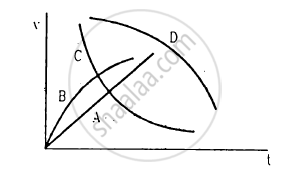Advertisements
Advertisements
Question
A spherical ball is dropped in a long column of a viscous liquid. The speed of the ball as a function of time may be best represented by the graph

Options
A
B
C
D
Solution
Initially, when the ball starts moving, its velocity is small. Gradually, the velocity of the ball increases due to acceleration caused by gravity. However, as the velocity increases, the viscous force acting on the ball also increases. This force tends to decelerate the ball. Therefore, after reaching a certain maximum velocity, the ball slows down.
APPEARS IN
RELATED QUESTIONS
Fill in the blanks using the word(s) from the list appended with each statement
For solids with elastic modulus of rigidity, the shearing force is proportional to . . . , while for fluids it is proportional to . .. (shear strain / rate of shear strain)
(a) What is the largest average velocity of blood flow in an artery of radius 2 × 10–3 m if the flow must remain laminar? (b) What is the corresponding flow rate? (Take viscosity of blood to be 2.084 × 10–3 Pa s).
In Millikan’s oil drop experiment, what is the terminal speed of an uncharged drop of radius 2.0 × 10–5 m and density 1.2 × 103 kg m–3? Take the viscosity of air at the temperature of the experiment to be 1.8 × 10–5 Pa s. How much is the viscous force on the drop at that speed? Neglect buoyancy of the drop due to air.
The unit of viscosity is
Which has greater viscosity, oil or honey? Why?
In a horizontal pipe of non-uniform cross-section, water flows with a velocity of 1 ms−1 at a point where the diameter of the pipe is 20 cm. The velocity of water (1.5 ms−1) at a point where the diameter of the pipe is (in cm)
Write down the expression for Stoke’s force and explain the symbols involved in it.
Two streamlines cannot cross each other. Why?
Why two holes are made to empty an oil tin?
A small metal sphere of mass M and density d1, when dropped in a jar filled with liquid moves with terminal velocity after sometime. The viscous force acting on the sphere is (d2 = density of liquid and g = gravitational acceleration)
From amongst the following curves, which one shows the variation of the velocity v with time t for a small-sized spherical body falling vertically in a long column of a viscous liquid.
The tangential force or viscous drag on any layer of the liquid is directly proportional to the velocity gradient `"dv"/"dx"`. Then the direction of dx velocity gradient is ____________.
In motors, more viscous oil is used in summer than in winter due to ____________.
An air bubble of negligible weight having radius r rises steadily through a solution of density σ at speed v. The coefficient of viscosity of the solution is given by ______.
A spherical solid ball of volume V is made of a material of density ρ1. It is falling through a liquid of density ρ2 (ρ2 < ρ1). Assume that the liquid applies a viscous force on the ball that is proportional to the square of its speed v, i.e., `"F"_"viscous"`= -kv2 (k > 0). The terminal speed of the ball is ______.
State and explain Newton's law of viscosity.
A force of 0.01 N is required to move a flat glass plate of area of 10 cm2 with a uniform velocity of 1 cm/ s over the surface of a liquid 2 mm thick. If the coefficient of viscosity of the liquid is 20 poise, the velocity gradient in the liquid layer is ______.
